Boat pollution
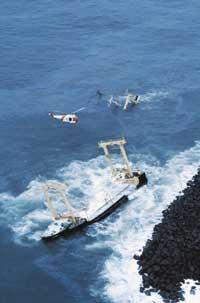
While the Mediterranean peoples fought hard, the Phoenicians went out into the sea with saleable products. What they had neither there nor here could be bought in a distant city and sold at a good price. Thus, what war does not guarantee was quickly achieved by the market, the spread on board all known world.
The idea invented by the Phoenicians continues to control the market. The best way to transport several products is on board. There is nothing more to think about oil. But security measures are not always guaranteed on these ships, and occasionally spills occur and ecological disasters fill the pages of newspapers.
The Jessika boats on the Galapagos Islands last January, Ievoli Sun on the Channel of La Mancha in previous November, Erika near the coasts of Brittany in December 1999, Nakhodka in the sea of Japan in January 1997, etc. Since 1990 there have been twelve major accidents with harmful discharges.
In addition, in the accident in November 2000, the dumping of the ship Ievoli Sun into the sea was not oil, but other chemical compounds with completely different properties. Most of the spill was styrene, a widely used substance in the polymer industry. Since styrene is very volatile, the stain left by the accident quickly disappeared. Therefore, the French authorities indicated that it was not very dangerous. However, the shortage of such spills means that the long-term effects have not yet been investigated. It can affect atmospheric chemistry and is long known as a carcinogen.
Eleven programs have been prepared to address this type of emergency. However, for economic reasons, the oil tankers are old and unattended. Consequently, it is very difficult to avoid spills.
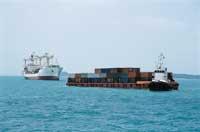
The reflections on the spill are of all kinds. Despite the fact that Jessica's accident has had a great impact, geographer Christophe Grenier of Nantes has denounced that the spill is one of the worst disasters in the Galapagos Islands. Grenier is an expert in the ecosystem of these islands. In his opinion, the daily fishing and exotic species carried out by man make their biodiversity in danger.
Marine gas station
In the 1990s there was a new controversy surrounding oil. Twenty years earlier the oil crisis occurred. It seemed that the sources were running out. Therefore, fuel companies introduced large sums of money to look for new sources. As a result, numerous oil platforms were installed without ecological awareness. When life is ending in full use, the situation has changed a lot.
In the North Sea, Shell was forced to close a floating tank used for twenty years and after a study decided to sink. The Brent Spar warehouse became a platform of great prestige thanks to the protest of Greenpeace. On April 30, 1995, entrepreneurs addressed the Brent Spar, launching the hanging and communicated banner.
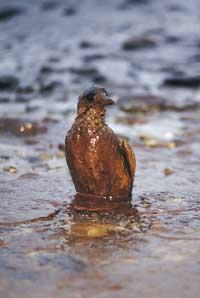
Greenpeace, considering that the platform contained heavy metals, asked Shell for a list of all substances stored inside. He proclaimed that the sinking of these substances would be an ecological disaster. A violent campaign against the company was carried out, including boycott in Germany. In response, Shell organized a competition to "park" in a Norwegian fiord Brent Spar and look for the most suitable solution. Currently the platform is dismantled and its top part is part of a Norwegian port.
The debate about this controversy is very interesting. In these cases, the conclusion is that we will normally have to learn more. A study conducted in 2000 found that for many bacteria living on the seabed, certain heavy metals are essential, that is, what happens in terrestrial ecosystems. A fact for reflection, no doubt.
Coral on the legs
Lophelia was also a surprise with coral pertusa. It inhabits the northeastern Atlantic and depending on the place it can produce large or small colonies. Around the Shetland islands are small isolated colonies and, off the Norwegian coast, has formed large coral reefs. For about 300 species these formations are a means of protection and life.
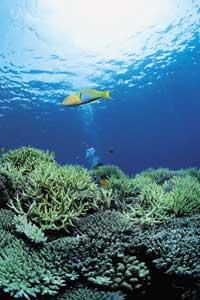
In the North Sea, when a platform near the Scottish coast was being dismantled, they found a colony attached to the legs. Through a submarine, biologists tested the discovery. This cold water species does not inhabit by itself in the North Sea, as it has a sandy bottom and therefore has no support. However, supported by the platforms, their growth was rapid. In addition, the "new" colonies grew faster than the speed measured in the colonies of the Atlantic rocks.
Until then coral was considered very sensitive to chemicals. But the colonies were found in a greasy environment whipped by a drill. When Brent Spar was dismantled, biologists also examined him and found the coral, including the perusa Lophelia. The controversy arose. The disappearance of everything put by man caused the disappearance of the colonies. What had to be done? According to the biologists, unlike what was done with the Brent Spar, the structures that had to sink. Regarding the natural coral ecosystem, Greenpeace won the trial against the UK government, so the oil industry will not be able to obtain authorization to exploit the areas where the colonies are located.
Structures composed of hot water corals can also be easily destroyed. Mechanical attacks could kill large reefs. Storms and especially hurricanes have a great influence on these ecosystems. In man, corals also suffer the consequences of naval traffic. In fact, in shallow waters are many boats that swell the reefs and, in some cases, they are ruined and they are trapped in an unpostponable place. In these cases, explosives are used to release the vessels; the explosion destroys large fragments of coral.
Such was the case of the Teratai Bunga, which transported pesticides and fungicides in November 2000. This Malay ship, on its journey from Singapore to Sydney, left the normal route and stood for twelve days at the Great Barrier Reef. With its weight, it reduced the part of 100 meters long and 20 meters wide of the seabed. Finally, after several explosions in the coral, he went ahead without spills.
Clouds per witness
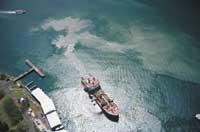
Even if there are no accidents, boats leave other traces in small quantities. In fact, oceanographers have identified in satellite images the usual routes of ships. In these routes clouds of water vapor are generated more easily than in other places. The origin of this phenomenon should be sought in fuel residues.
About ten years ago it was concluded that the climate is controlled by phytoplankton through the dimethylsulfide molecule (DMS). From DMS, by oxidation, sulfur dioxide is formed and part of this compound becomes sulphate aerosol, one of the nucleators of cloud formation.
But ships also emit sulfur, directly in the form of sulfur dioxide. A 1999 study found that sulfur emissions from packaging were higher than those of plankton. But this pollution is a great paradox, since the clouds thus generated reflect very well the sunlight and ultimately have a greater anti-heating effect of the Earth.
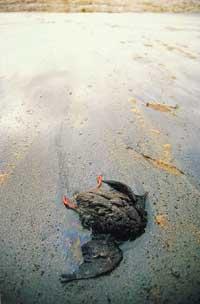
Another family of waste components, nitrogen oxides, have a similar effect. They are molecules that increase the amount of tropospheric ozone. In addition, as in the case of sulfur, they become aerosols that increase the capacity of reflection of clouds. However, research on these processes is recent and the consequences are not fully known.
Many scientists believe that, despite having reported some advantage, pollution is generally harmful.
Giant tankers make very long journeys. They are stable structures of great weight during the conduction of oil. However, if they had to travel back with simple oil tanks, the boat would be very weak and the trip would be dangerous. Therefore, they fill the tanks with sea water to carry them in the form of ballast and once in the port of origin, they release the water.
Seawater is accompanied by all the animals, algae, bacteria and viruses that inhabit it. By releasing ballast water far from the reception site, living beings reach a strange ecosystem. A group of scientists from the University of Maryland in the United States studied these biological spills. All the samples taken in the study were found, among others, the bacterium Vibrio cholerae, which produces cholera in humans.
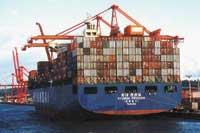
This bacteria is just one example. Other microorganisms are dispersed between the corners of the world through tankers. In 1998, a type of American jellyfish was introduced into the Caspian Sea by a ship transported in ballast waters. The jellyfish multiplied and cleaned the local zooplankton with the consequences. Populations of pelagic fish caught by fishermen were also significantly reduced.
Styrene odor
If you analyze shipbuilding issues, you will find another type of chemical sustenance. The main material of this activity has been long since it was wood. Metal has also been discarded. As in other technologies, polymers have been a real revolution. In fact, the mixture of polyester and fiberglass is considered a classic material in the shipyards. However, a resin with large amounts of styrene is often used to protect these structures.
European regulations are very strict with approved styrene concentrations. For this reason, several European shipping companies and experts from other industries have come together to carry out new research. It proposes the use of other material for the realization of basic structures. The use of polypropylene instead of polyester prevents the addition of resins through thermoplastic procedures. The research of these new materials promoted in Europe is very representative. Little by little we talk about the pollution produced by ships. If we want a sustainable exploitation of the sea, it should.





